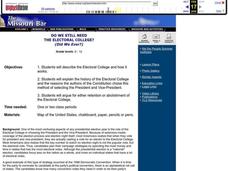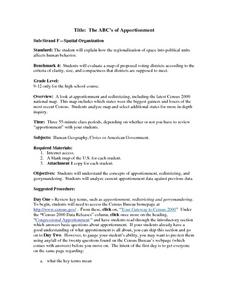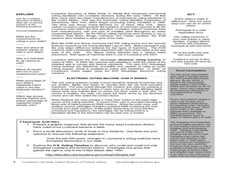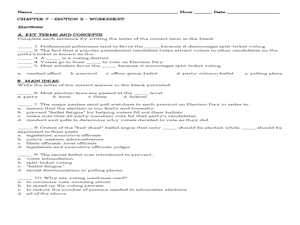Curated OER
Women Get the Vote!
Students research the history of United States voting rights to describe and analyze why voting rights and responsibilities are important. They investigate famous suffragists like Susan B. Anthony and then create a "wanted" poster and...
Curated OER
Who Can Vote? Chart
Students become familiar with historic and contemporary issues connected to voting rights around the world. They research the voting rights history of their country and then compare information about voting rights in at least three...
Curated OER
Voting and Elections: Vote to Make a Difference
Students use a ballot to make a choice about two items to vote on. In this voting lesson plan, students discuss comparing choices between two items, the benefits and drawbacks to each, and make tally marks to total the votes.
Curated OER
Race and Voting in the Segregated South
Learners examine the history of African American voting rights. In this voting rights lesson, students listen to a lecture on African American voting rights between the years 1890 and 1965. Learners respond to discussion questions...
Curated OER
Ohio Statehouse History
Fourth graders examine the history of the Ohio Statehouse and order the major historical events in its development. The instructional activity traces the development from the time of Ohio's vast wilderness to the house's completion in 1861.
Curated OER
Special Interests: How Would A Legislator Vote?
Students act as elected officials who must make decisions that will make someone unhappy. They consider five bills that are up for vote in light of the contributions that many special-interest groups made to their campaigns. Students...
Curated OER
Inform Your Vote
Students examine and participate in the election process, analyze current event topics and offer their opinions. They then share their viewpoints on civic issues. They are encouraged to do additional research on the election's hot issues.
Curated OER
Do We Still Need the Electoral College?
One of the most confusing aspects of any presidential election year is the role of the Electoral College. Learners read a bit about how the Electoral College works and then they hold a mock election in their classroom. They'll redraw a...
Curated OER
Voters, Ballots, and Elections: Matching
After studying voting and elections in the United States, have your class show what they know. They match 15 terms related to voting, ballots, and elections to the proper definition. This is a great way to practice vocabulary or content...
Curated OER
Why Vote? A Public Awareness Campaign
Students examine the structure of local government and determine why citizens vote. In this civics lesson, students listen to a lecture about the structure of local government and then encourage others to exercise their right to vote.
Curated OER
Elections: In the UK
Voting, members of Parliament, and elections are the topics of this interesting presentation. Follow the British voting process from turning in a ballot, to the jobs of the members of Parliament. Whether you live in the UK or not,...
Curated OER
Voting: Your Civic Responsibility
Fifth graders research the viewpoints of the major Presidential candidates. Using this information, they create brochure comparing and contrasting them on important issues. They write a persuasive essay to state the importance of voting...
Curated OER
Issue 1 - Designed to Add Technology Jobs
Young scholars research the statewide initiative on the Ohio ballot of 2003. They form teams to debate the issue of using bond proceeds to encourage technology research. The class votes on which individual/team presented the best...
Curated OER
Early Voting, Other Election Changes are Possible
Students use the internet and linked sites to explore current voting methods in their community. They research suggestions that have been made for changes and interview people who made these suggestions (when possible). Students suggest...
Curated OER
Voter Fraud: Are Ghosts Going To The Polls
Students research background material about voting in their community. They interview local/county election officials to see what is going on in the community. They also interview teachers, and students to determine if they are newly...
Curated OER
Young Voters Make A Difference
Students research recent statistics on voting by those 18 to 24. They survey senior students to determine their intent to vote in the next election. Students display the data in charts and graphs. They write the results and share it with...
Curated OER
The ABC's of Apportionment
Students are introduced to the terms of apportionment and redistricting. Using a Census map, they identify the states that had the highest and lowest numbers of change during the past ten years. They examine a map of voting districts and...
Curated OER
How We Vote
Students fill in a graphic organizer and discuss the struggles in groups about the history of voting in Louisiana. Students also explore a voting timeline to see who could and could not vote before and after 1850.
Curated OER
Right to vote...in the wrong place
Students create a presentation for other class members or for a local citizens' group explaining how they can guard ensure voter rights. Students research the Ohio Secretary of State's stand on provisional voting rules.
Curated OER
We the People: A Study in American Voter Turnout: US Government
Learners examine and compare voter turnout in US Elections. They write a letter to a favorite candidate or representative suggesting ways to increase voter turnout.
Curated OER
Voting Simulation
Students explore the process of voting. They study the lawmaking branch of the state government.
Curated OER
Elections: Ch 7
Identify the main idea, key terms, and concepts with this activity on US Elections. There are 5 fill in the blank and 5 multiple choice questions for your class to answer.
Curated OER
ONE VOTE
In order to understand the political process and the importance of voting, pupils will construct a class time line. They will group up and research a specific era, creating a time line of political events where one vote made a...
Curated OER
By George, I Think We Have It: Bicentennial quarter reverse
Voting is one of the major reasons the US adopted public education. Educate your class populace, they will analyze the images on a bicentennial quarter and think about the contributions George Washington made to the United States. They...

























